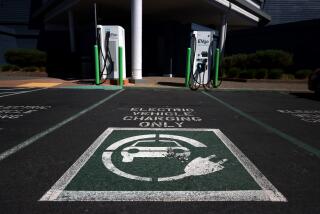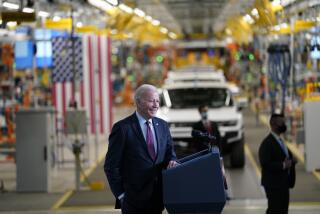Auto MPG Boost Deemed Feasible
- Share via
WASHINGTON — A long-awaited scientific study concluded Monday that U.S. auto makers have the ability to significantly increase the fuel economy of sport-utility vehicles and passenger cars, a finding expected to boost efforts in Congress to raise the miles-per-gallon standards for the first time in years.
“The committee found a variety of technologies, both new and emerging, that could be implemented in the next 10 to 15 years that would result in significant improvements in fuel economy,” said Paul Portney, chairman of the National Academy of Sciences panel that studied the fuel-efficiency issue.
The panel, whose findings are expected to guide the Bush administration and Congress, stopped short of recommending a specific increase in the standards, saying the decision is better left to elected officials. It noted that any change would require “uncertain and difficult trade-offs,” such as how stricter standards might affect passenger safety, vehicle costs, global warming and U.S. dependence on foreign oil.
But it said the standards could be substantially increased without drastic reductions in vehicle weight or size, and at a cost that could be recovered from fuel savings over the life of a vehicle.
The report drew praise from Democrats and moderate Republicans who are seeking to strengthen the fuel-economy provisions contained in an omnibus energy bill scheduled for House consideration later this week.
As written, the measure would require SUV makers to save 5 billion gallons of gasoline from the 2004 to the 2010 model years. Advocates of a stronger measure say that requirement would amount to an efficiency increase of less than 1 mile per gallon. They are pushing instead to require SUVs to meet the same fuel standards by 2007 that passenger cars meet today.
Passenger cars currently must meet a “corporate average fuel economy,” or CAFE, standard of 27.5 mpg, last adjusted in 1989. But light trucks, a category that includes SUVs, minivans and pickups, are permitted to meet an average of 20.7 mpg, unchanged since 1994. SUVs have been targeted because light-truck sales--a fraction of the market when the fuel-economy law was passed in 1975--have risen dramatically and are expected this year to exceed sales of passenger cars for the first time. As a result, overall average fuel economy for vehicles in the 2000 model year fell to 24 mpg, the lowest since 1980.
Environmentalists have called tougher miles-per-gallon rules for SUVs the single most important step that Congress can take to cut U.S. dependence on foreign oil and reduce emissions of carbon dioxide, a gas linked to global warming. The auto industry has contended that tougher standards could make SUVs less safe, put U.S. auto makers at a disadvantage and limit consumer choice.
White House Press Secretary Ari Fleischer said the study highlights promising new technologies that can increase mileage but also warns of the potential of more deaths on the road if vehicles become lighter.
“So there’s a series of trade-offs that the National Academy of Sciences recognizes involving higher fuel mileage and transportation safety,” he said.
Fleischer took pains to decry an act of Congress that specifically restricts the Bush administration’s ability to fully review and act on the study.
“If Congress is serious about helping the administration find productive and balanced ways to increase energy efficiency and conservation, Congress should remove the prohibition so the administration can get working on this . . . study right away without delay,” he said.
Congress had barred the administration from studying tougher fuel-economy standards. But the prohibition, included in the annual transportation appropriation bill since 1995, is not in a proposed spending bill for the new fiscal year.
Rep. Henry A. Waxman (D-Los Angeles), who supports tougher standards, called the report “a pretty clear endorsement of our position. It certainly left no doubt that we can do better.”
“It is now beyond reason to argue that Americans lack the technological capacity to make significant savings through fuel economy standards,” added Rep. Edward J. Markey (D-Mass.).
“Overall this is a positive report,” said Sen. Dianne Feinstein (D-Calif.). “It debunks the myth that closing the SUV loophole would jeopardize safety. . . . It establishes that the technology is available to improve fuel efficiency. The only question is the length of time required to implement that technology.”
But the auto industry and its supporters in Congress seized on a finding by a majority of the panel’s members that the move toward lighter, more fuel-efficient vehicles in the late 1970s and early 1980s probably resulted in an additional 1,300 to 2,600 traffic deaths in 1993.
Rep. John D. Dingell (D-Mich.) cautioned his colleagues to proceed with “prodigious care and without undue haste.”
Among the technologies cited in the report are engine advances such as variable valve timing and more efficient powertrains, such as five-speed automatic transmissions.
“It’s not pie-in-the-sky technology,” said Charles Lave, a professor emeritus of economics at UC Irvine who served on the panel. Lave said many of the technological advances already are in use in other countries where gas prices are higher.
However, it could take decades before new, more fuel-efficient vehicles have replaced the 200 million cars currently on the road, the panel said. Portney said the new technologies should make it possible for auto makers to improve gas mileage without reducing a vehicle’s weight or performance.
“It’s entirely possible that if fuel economy standards were tightened that motor vehicle manufacturers might choose as a strategy to reduce weight at least somewhat,” said Portney, president of Resources for the Future, a Washington think tank specializing in energy and the environment. “So it’s very difficult to make predictions about what might happen to safety in the future if [fuel economy] standards were tightened.”
On the other hand, he said, if standards were made tighter for larger vehicles, that could reduce the disparity in weights between passenger vehicles on the road. “If we reduce the disparity and the sizes of cars, then you could even have a favorable effect on safety,” he said.
Portney said that the costs of implementing the fuel-saving technologies could mean an increase in the cost of a vehicle of a couple of hundred dollars to as much as $1,500. But supporters of tougher miles-per-gallon rules contend that consumers would recover the higher costs in fuel savings.
For example, increasing the fuel economy of a mid-size SUV from 21.1 mpg to 28.2 mpg would cost an estimated $1,056. But that increased cost would be recovered in 14 years, according to the panel’s calculations.
“For all of the criticism that SUVs get, people buy them for a reason. They’ve got some features that they really like and those might be sacrificed,” Portney said in an interview. “Better fuel economy on the one hand. High cost and some reduction in performance or vehicle attributes on the other. And that’s what Congress has to balance.”
Congress ordered the report to help settle a dispute that has pitted environmentalists, most Democrats and moderate Republicans against anti-regulatory Republicans, Democrats from auto-producing states and labor unions. The academy is an independent agency chartered by Congress to advise government on scientific and technical issues.
Thomas A. Gottschalk, executive vice president of General Motors, said the study “confirms the major shortcomings of the CAFE program, including its serious safety penalty and the need to resolve difficult trade-offs.”
But David Friedman, senior analyst of the Union of Concerned Scientists’ clean vehicle program, said the study provides “more proof that higher fuel economy levels are possible, safe, and would save consumers money,” and “effectively ends the debate over whether fuel economy standards should be raised.”
“I’m genuinely surprised,” said Dan Becker, director of the Sierra Club’s global warming and energy program, who had criticized the panel for being tilted toward industry. He called the report a “triple for the environment, but not a home run,” noting that it could have called for a bigger and more specific increase in standards.
The earliest that any mandated fuel-economy increases could be made, according to officials, is the 2004 model year.
The panel recommended changes in the fuel economy program to give auto makers greater flexibility, such as allowing manufacturers to sell fuel-economy credits to each other to help them meet the standards.
*
Times staff writers Edwin Chen and Elizabeth Shogren contributed to this story.







